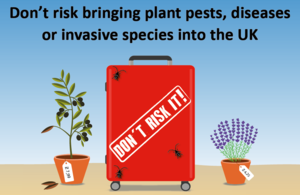Public urged not to bring plant pests and disease into the UK
Plants, seeds, flowers, fruit or vegetables can carry pests and diseases that would destroy UK plants, trees and crops.

Protecting our plants and trees for future generations
The UK is blessed with a magnificent and diverse range of plants and trees. They beautify landscapes, public and private gardens and urban areas providing habitats and food to support our wildlife. Yet the threat to the health of our plants and trees from pests and diseases is real and increasing, and we need a strong response.
We must do all we can to reduce these threats and the ‘Don’t Risk It’ campaign aims to protect our country by asking you to not bring back plants, seeds, flowers, fruit or vegetables into the UK from your travels abroad. Pests and diseases can be present on plants, seeds, flowers, fruit and vegetables, even if they look healthy, and on soil clinging to the roots of plants or on plant products, like root vegetables.
Our border inspectors currently carry out around 70,000 physical checks of imported plants each year and are highly effective. This is expected to increase to around 125,000 physical checks each year. To meet this demand we have recruited 200 more plant health inspectors over the past two years with recruitment ongoing for nearly 150 more. The UK Plant Health risk register contains details of over 1200 plant pests and pathogens which are regularly reviewed and prioritised for action, by government and industry.
But we cannot eliminate all risks and we all have a part to play in protecting our plants and trees for future generations to enjoy.
One of the biggest threats to the UK
One of our big concerns is Xylella, one of the most dangerous plant diseases worldwide. Although Xylella is currently not in the UK, it is present in regions of Italy, France, Portugal and Spain. Its presence causes major economic and environmental impacts.
Any outbreak in the UK would lead to widespread destruction of plants and trees, the restriction of horticultural trade and the use of pesticides to control the insects which spread the disease. In Italy it is estimated that impact of Xylella on olive trees alone has so far amounted to a loss of €390 million in the past three years.
Xylella has a very broad list of plants and trees that are capable of being infected and carrying the disease, some of which are seen as higher risk than others. At present Polygala myrtifolia, Olive, Lavender, Rosemary, Almond and Nerium oleander are considered the most significant threat to the UK, but the host list is changing frequently, which is why our advice relates to all plant species.
More information and advice on Xylella can be found on Defra’s UK Plant Health Portal.
How you can play your part
Based on known threats, there are already restrictions or bans on bringing some seeds, fruits, vegetables, cut flowers and live plants back into the UK. More information on these can be found on the food, plant and animal product imports page.
However, with new pests constantly emerging, it doesn’t take much for these threats to take root in our ecosystems. We ask that you help protect our nation’s plants and trees by not bringing back any plants or seeds, flowers, fruit or vegetables to the UK. In this way you can play your part, alongside the actions of government and industry, by avoiding bringing back something which may be infested or diseased.
If you have enjoyed seeing a certain plant or tree on your travels and want to enjoy it in your own garden, or in your home, then always buy from a UK garden centre or supplier. This is the best way you can be sure that they have been sourced responsibly and gone through the necessary processes to ensure they are free from pests and disease.
If you want to learn more, check out the Plant Health Portal, including if you have concerns that your plants are infected with Xylella. If you need to report a suspect pest or disease finding, please contact your relevant plant health officials.
- for England and Wales, contact APHA’s Plant Health and Seeds Inspectorate on 0300 1000 313 or [email protected]
- for Scotland, contact the Scottish Government’s Horticulture and Marketing Unit on [email protected]
- for Northern Ireland, contact DAERA Plant Health Inspection Branch on 0300 200 7847 or [email protected]